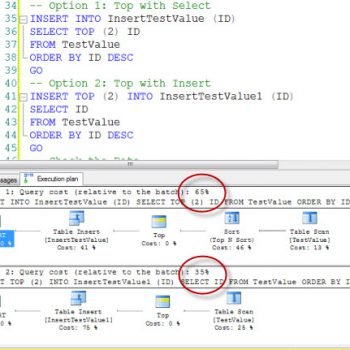Earlier we discussed about the what is the common solution to solve the issue with CXPACKET wait time. Today I am going to talk about few of the other suggestions which can help to reduce the CXPACKET wait. If you are going to suggest that I should focus on MAXDOP and COST THRESHOLD – I totally agree. I have covered them in details in yesterday’s blog post. Today we are going to discuss few other way CXPACKET can be reduced.
Potential Reasons:
- If data is heavily skewed, there are chances that query optimizer may estimate the correct amount of the data leading to assign fewer thread to query. This can easily lead to uneven workload on threads and may create CXPAKCET wait.
- While retrieving the data one of the thread face IO, Memory or CPU bottleneck and have to wait to get those resources to execute its tasks, may create CXPACKET wait as well.
- Data which is retrieved is on different speed IO Subsystem. (This is not common and hardly possible but there are chances).
- Higher fragmentations in some area of the table can lead less data per page. This may lead to CXPACKET wait.
As I said the reasons here mentioned are not the major cause of the CXPACKET wait but any kind of scenario can create the probable wait time.
Best Practices to Reduce CXPACKET wait:
- Refer earlier article regarding MAXDOP and Cost Threshold.
- De-fragmentation of Index can help as more data can be obtained per page. (Assuming close to 100 fill-factor)
- If data is on multiple files which are on multiple similar speed physical drive, the CXPACKET wait may reduce.
- Keep the statistics updated, as this will give better estimate to query optimizer when assigning threads and dividing the data among available threads. Updating statistics can significantly improve the strength of the query optimizer to render proper execution plan. This may overall affect the parallelism process in positive way.
Bad Practice:
In one of the recent consultancy project, when I was called in I noticed that one of the ‘experienced’ DBA noticed higher CXPACKET wait and to reduce them, he has increased the worker threads. The reality was increasing worker thread has lead to many other issues. With more number of the threads, more amount of memory was used leading memory pressure. As there were more threads CPU scheduler faced higher ‘Context Switching’ leading further degrading performance. When I explained all these to ‘experienced’ DBA he suggested that now we should reduce the number of threads. Not really! Lower number of the threads may create heavy stalling for parallel queries. I suggest NOT to touch the setting of number of the threads when dealing with CXPACKET wait.
Read all the post in the Wait Types and Queue series.
Note: The information presented here is from my experience and I no way claim it to be accurate. I suggest reading book on-line for further clarification. All the discussion of Wait Stats over here is generic and it varies by system to system. You are recommended to test this on development server before implementing to production server.
Reference: Pinal Dave (https://blog.sqlauthority.com)






4 Comments. Leave new
hi,
we are encountering cxpacket issues in our production system
when we are supplying 160 gb file on 6 th day of every month and this file
won’t be supplied every day.whenever we are supplying the file only during next day we got error.(cxpacket).
when the package was executing on first time after supplying the file
the issue cxpacket come and if the query was killed and we try to execute the same package using the below mentioned query scenario.the run was susccessful.plaese give solution on this as aeraly as possible.
the query that we used are used is delete statement calling select statement.
Hi Pinal,
I’m also facing the same type issue as Anu. Could you please tell us the solutions ..
Arindam Das
I have to solution which will work for your environment.
Under Potential reasons, you mean, “INCORRECT amount of the data”, right?